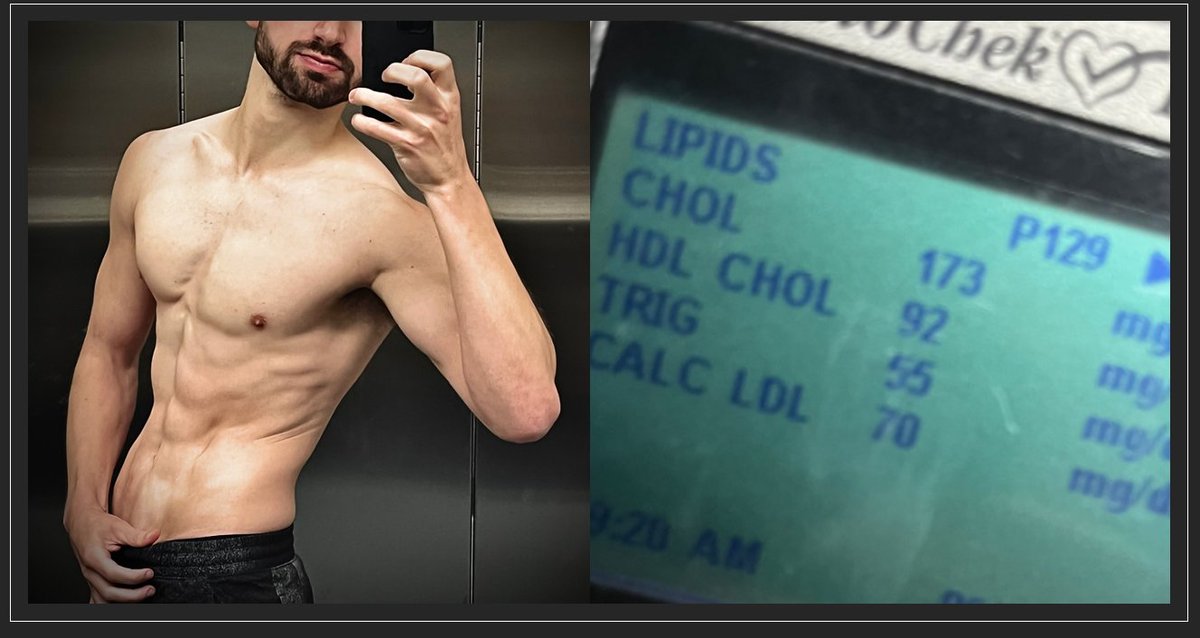
If I went #vegan #keto for 3 weeks, do you think I’d still be #LMHR? @realDaveFeldman @siobhan_huggins @drscottyk @AlbertSyMD
1/ Okay, I'm putting a bow on this. And, short answer is... yes, the 37% have it. You can be on a 0 cholesterol #vegan #ketogenic diet and be #LMHR. Now for a debrief with some reflections. @realDaveFeldman @AlbertSyMD @siobhan_huggins @drscottyk ... 

2/ First and foremost, what did my diet look like?
Vegan and w/o no coconut to maintain low sat fat % <15% total fat. These are data from a day of soy protein, 1/4c tahini, 1lb eggplant, 100g broccoli, 6 Tbsp EVOO, 4 Tbsp avo oil, 2 oz ea macadamia and pecans, 200g asparagus
Vegan and w/o no coconut to maintain low sat fat % <15% total fat. These are data from a day of soy protein, 1/4c tahini, 1lb eggplant, 100g broccoli, 6 Tbsp EVOO, 4 Tbsp avo oil, 2 oz ea macadamia and pecans, 200g asparagus

3/ My net carbs definitely came up a bit. My ketones ran lower than usual, in ~0.3 - 0.7 mM range, whereas they are usually ~1 mM. IGained 3lbs in 2weeks, although I believe was eating slightly fewer kCal than normal (didn't track every day) so take that with a grain of salt 

4/ I didn't feel horrible. Given my personal taste preferences, the diet itself actually didn't end up being that hard. I mostly missed fish and cheese. I quite enjoyed tahini on roasted eggplant with EVOO, actually. The main down side for me was that bathroom time increased
5/ As for my lipids, they did remain in the LMHR range. I had a midpoint check on cardiochek, that I shared with @realDaveFeldman IRT and it seems they were stable/increased from the midpoint (probably because my net carbs were highest week 1)... 

6/ Now, one could argue many mechanisms and that a 2 week duration is not enough time, but it appears to be the higher end of standard for Twitter n=1 LMHR adventures, if you've been following (nb: said 3w in the poll, but the 3 was a typo. 2 was always intended)
7/ And one could also argue that I'm an outlier and something "hand wavy"/genetics/microbiome is at play in me specifically. Maybe so, but even anecdotal data should be explicable and, as it stands IMHO, the #LEM is the only model that can explain these results...
8/ Being particularly lean, fat-adapted, with high energy demands, I was the ideal candidate to attempt this expt and do not think any current #LMHR would necessarily have the same results. LEM doesn't exclude other modifying contributions, e.g. sat fat; however, point remains... 

9/ It appears to be possible to be #vegan #keto #LMHR ... which I can't explain any other way than the LEM. Of if you haven't been following, I can get my LDL MUCH lower eating more sat fat and cholesterol if I simply include carbs. My lowest was 70mg/dl with ~100g net carbs
10/ Anyway, putting the bow on this one
I was on the fence about whether to sensationalize it in a new post and thread (would have been cathartic)
But, honestly, I don't want to fan the fire of the n=1 LEM war after recent events. So...
I was on the fence about whether to sensationalize it in a new post and thread (would have been cathartic)
But, honestly, I don't want to fan the fire of the n=1 LEM war after recent events. So...
11/ ... I put this out there on the DL to follow-up w/ those who are deeply interested, but I would ask this not be used as cannon fodder. Instead, let's wait for the research to properly evolve... cuz it's coming... quickly. Stay curious.
• • •
Missing some Tweet in this thread? You can try to
force a refresh











